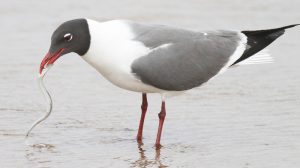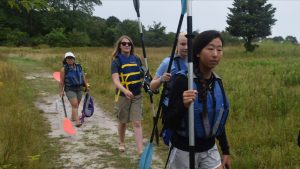Search results for: VIPREG2024 how to get promo code in 1xbet Dominican Republic
Performance Requirements in Ocean Mineral Development
Performance Requirements in Ocean Mineral Development Hoagland, P. Marine Policy Reports, Vol. 9, No. 3, pp. 5-10, 1987 WHOI-R-87-001
Read MoreResearch on education: Learning by Listening to Marine Mammal Sounds
Learning by Listening to Marine Mammal Sounds Humpback whale photo courtesy of NOAA. Sept. 2018 — A Sea Grant-funded project aims to make science accessible to visually impaired students. Carla Curran, professor of marine sciences at Savannah State University, and Laela Sayigh, a biologist at Woods Hole Oceanographic Institution, worked with Kathy Patterson, the manager…
Read MoreThe Little Fish with a Big Impact
In the Gulf of Maine, there’s a little eel-like fish not much bigger than a large pencil, that buries itself in the sand in the summer and swims up and down in the water column in the spring and fall. It’s called a sand lance and it’s incredibly important to the ecosystem of the Gulf of Maine. If you like whale watching, this little fish is the biggest reason you might or might not see a whale:
Read MoreShellfish Resource Management in Massachusetts
Shellfish Resource Management in Massachusetts Helpful to educators and students. Leavitt, D.F. Focal Points, 3 pp., 2000 WHOI-G-00-003
Read MoreBulletin: Beach and Dune Profiles: An Educational Tool for Observing and Comparing Dynamic Coastal Environments
Bulletin: Beach and Dune Profiles: An Educational Tool for Observing and Comparing Dynamic Coastal Environments Beaches and dunes are in constant motion, continually changing shape and shifting position in response to winds, waves, tides, relative sea level, and human activities. The most significant changes occur seasonally and following storms.
Read MoreMy Girls in Science Experience – by Eugena Choi
Last February, when I heard about the Woods Hole Girls in Science program, I was excited. It combined my passion for conservation with marine biology, and I decided – on the spot – that I was going to go. I worked on my application for months before sending it in, and when I got the…
Read MoreBulletin: Clam Tents: A New Approach to Soft-Shell Clam Culture and Management
Bulletin: Clam Tents: A New Approach to Soft-Shell Clam Culture and Management Soft-shell clams, Mya arenaria, are an enigma to scientists, managers, and shellfish harvesters in southeastern Massachusetts and throughout the bivalve’s range. One year, clams may settle in very dense concentrations, while, the following year, there may be no soft-shell clam recruitment at the…
Read MoreWHOI-W-05-001 Whitlach, B. International Inv
WHOI-W-05-001 Whitlach, B. International Inv
Read MoreTeacher Workshop April 2002
Teacher Workshop April 2002 “Determining the Resistance of Marine Animals to Environmental Chemicals” Dr. Mark Hahn, WHOI, Biology Department Dr. Hahn’s major research interests include receptor-mediated mechanisms of toxicity, and means of adaptation and acquired resistance to exposure to persistent organic pollutants. This presentation centered on looking at toxins in the marine environment, particularly dioxins,…
Read MoreChina Sea Coastal and Marine Nonfuel Minerals: Investigation and Development
China Sea Coastal and Marine Nonfuel Minerals: Investigation and Development Hoagland, P., J. Yang, J.M. Broadus, and D.K.Y. Chu In: Marsh, J.B. (ed.), Resources and Environment in Asia’s Marine Sector, Taylor & Francis, New York, pp. 219-275, 1992 WHOI-R-92-010
Read More

